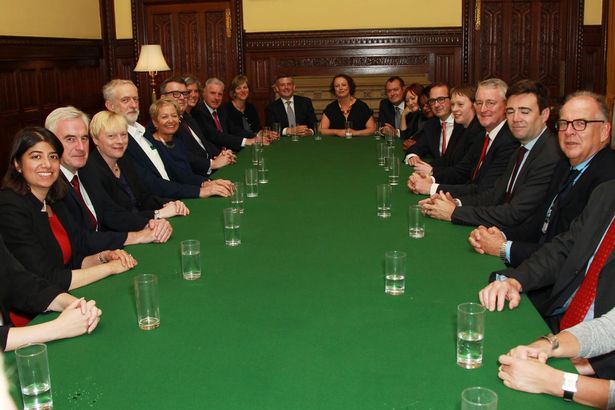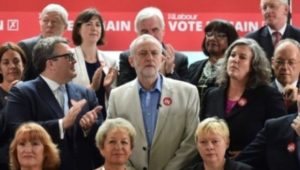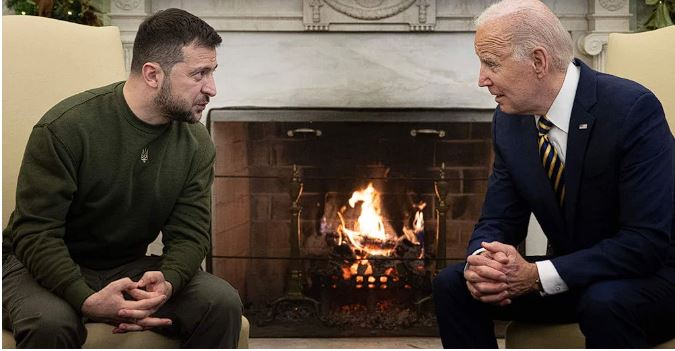
On the disgraceful coup attempt against Jeremy Corbyn.
.
The vast majority of U.K. Labour MPs—81 percent—and their accomplices in the country’s liberal media are attempting a coup against Jeremy Corbyn. He was elected by Labour’s members only nine months ago with the largest mandate ever won by a leader. He won because he had set himself apart from the other candidates throughout his decades in office by doing things like voting against the Tory’s attack on the poor last year while 184 Labour MPs (88 percent) abstained. He also voted against the Iraq War while his most prominent opponents in Labour were strongly in favor, and he has been a politically courageous advocate of Palestinian rights.
To have such a genuinely left wing anti-war leader at the head of a party that Tony Blair led to perpetrate the worst crime of the 21st century was going to be a huge challenge. A determined group of Blairite MPs have teamed up with the establishment media to attack Corbyn since the day he was elected. Incidentally, anywhere from 500,000 to a million Iraqis would be alive today if anything resembling the shadow Cabinet mutiny against Corbyn had taken place against Blair. Then again, thanks to the establishment media, the U.K. public has no clue about the death toll from that gruesome crime.
The politically and morally defunct David Cameron—the Tory leader who has already announced his resignation after the U.K.’s Brexit vote—also made an empathic appeal for Corbyn to resign. I wonder how many of Cameron’s soul brothers and sisters among Labour MPs were smart enough to silently wish that Cameron had shut up. The number may indeed be shockingly small.
Immediately after Corbyn was elected, in an effort to be inclusive, and take away one pretext for a coup, Corbyn reached out to the faction of Labour that he had just crushed in the leadership election and gave many of them shadow Cabinet positions. They used those Cabinet positions to undermine the coherence of the party’s message. Perhaps the most dramatic example was Hilary Benn’s speech in support of bombing Syria which was joyously applauded by Tory MPs.
As Labour MP and staunch Corbyn ally, Dianne Abbot, put it: “This is not the PLP (Labour MPs) versus Jeremy Corbyn; this is the PLP versus the membership.”
Staggered shadow Cabinet resignations, a rushed secret ballot vote of no-confidence by Labour MPs, and the liberal media’s pressure were supposed to have made Corbyn resign by now. A large proportion of the hundreds of thousands of new members whom he had inspired to join the party were to be driven away in disgust with Corbyn’s betrayal. As I write this, Corbyn has held admirably firm and challenged the PLP to convince the members to vote him out.
Recent polls of the membership illustrate that Corbyn might very well slaughter any opponent in a leadership election. His enemies have no popular challenger and appear to have bet the farm on getting Corbyn to resign. Their plan B, if you can call it that, would be to keep him off the ballot through legal chicanery, an even more repugnant attempt to win ugly. Plan C may be to hope and pray that they can demoralize Labour members into voting against Corbyn. They may use the media to weaken Corbyn’s support among Labour voters and hope it erodes his support among members. However, very recent polling of Labour voters (not only members) shows solid opposition to Corbyn resigning. Moreover Corbyn’s stunning leadership win months ago should have taught them the risks of overestimating the media’s power.
Whatever rationalizations Labour MPs used to justify participating in the coup attempt against Corbyn, or for abstaining rather than voting against Cameron’s attacks on the poor, or for failing to launch any such mutiny against Tony Blair to prevent the supreme international war crime, the truth is they do not offer a remotely adequate challenge to the rise of xenophobia and racism. Nobody should scratch their heads over the rise of the far right when real progressive alternatives are relentlessly ridiculed and undermined.
Corbyn campaigned for the U.K. to remain in the EU. Overall, the progressive case for voting to remain was stronger that the case against. Corbyn made the case honestly and effectively, without glossing over the EU’s grave shortcomings. He refused to even wink at xenophobia as Guardian columnist PolyToynbee pilloried him in two recent op-eds for not doing.
If Corbyn wins a leadership election, he should reorganize the Labour party so that members need no longer fear being sabotaged. If his enemies believe in their popularity and self-professed political acumen, they should have no problem sweeping to power with another party.
Political courage is rare even in politicians who have decent impulses. If standing up to establishment vilification and ridicule were easy the world would be a radically different and better place. Thus far, Corbyn demonstrated such courage in spades by simply saying that his foes must oust him in a leadership election in which he is a candidate. His supporters rally in the streets while his foes rally establishment pundits and journalists. A struggle for meaningful democracy is a largely a struggle against the establishment media. Anyone who does not share the media’s contempt for democracy and the left can only hope Corbyn continues to stand his ground.
Joe Emersberger




Brilliant article – thanks Joe!
“Nobody should scratch their heads over the rise of the far right when real progressive alternatives are relentlessly ridiculed and undermined.”
Exactly! it strikes me that Corbyn has been very Ghandi like in stoically turning the other cheek in the face of nine months of ridicule from every corner of the Crown establishment. He has resisted the temptation to join in the game of scoring rhetorical points during PMQ in order to focus on issues and expose slick dodgy Dave for what he is – a moral criminal! I’m rooting for JC to maintain the strength and courage to oppose all of these neoliberal forces and give the people a hero to rally around!
I agree with a lot of this. But …
I voted for Jeremy as Leader because he was the only candidate wo saw the need for Labour to take a strong stand against neoliberal economic policies, at home and internationally. I did not ask myself which of the four would appeal most to the public as a potential Prime Minister. If any or all of the others had espoused anti-neoliberalism then I would have chosen amongst them on the basis of who had the best chance of leading Labour to victory in a general election. In which case I would have weighed Jeremy against the other/s and may or may not have ended up voting for him.
In short, I believed (and still do) that pursuing anti-neoliberalism was the priority policy goal for Labour and far and away the priority goal for our poorest people and the world’s poor, and I was more than happy for Jeremy to give it a go and prove his capability as Leader and as a potential PM.
But I believe that from the start Jeremy has shown that he is not adept at the kind of politicking which is necessary to achieve success in a general election. I also think he has pursued personal political agendas and by doing so has distracted attention away from the main issue – his economic case – and opened himself up to media attacks. As it happens I share these other agendas –not bending the knee to royalty, not singing the national anthem, scrapping Trident) – but I absolutely do not want to see Labour’s chances of implementing an anti-neoliberal economic strategy (which requires being elected to government) put at risk by Jeremy opening himself up to constant attack on these other issues. They are secondary, in my view and what is more I did not vote for Jeremy on the basis of his take on these issues.
And there is a general lack of nous problem. Of course Jeremy was not being anti-Semitic when the drew a parallel between Jews being attacked for the behaviour of Israel and Muslims being attacked for the actions of ISIS, but what a hazard to fortune to make this comment – at the launch of the Party’s antismtism report, no less!
I, too, hold Jeremy in high regard for his lifetime of work for justice and tolerance and equality. But he seems to have little sense of audience, of the ‘reader over his shoulder’. I am not advocating pandering to the media, but to act as if they did not have the power which they manifestly have, and to ignore their malignancy towards anything ‘left’, is so damaging to Labour’s chances of winning a general election.
I am now one of those who hope that Jeremy stands down having achieved a contract which ensures that the Party and a new leader sticks to the anti-neoliberal line and holds this as Labour’s priority policy (and that McDonnell stays as Shadow Chancellor). If this can’t be achieved and a fresh election is held then if Jeremy is again the only candidate with an anti-neoliberal stance, then I will vote for him again. In terms of the policy, I believe there can be no turning back: the real calamity for the party would be for it to return to a version of its Blairite past.